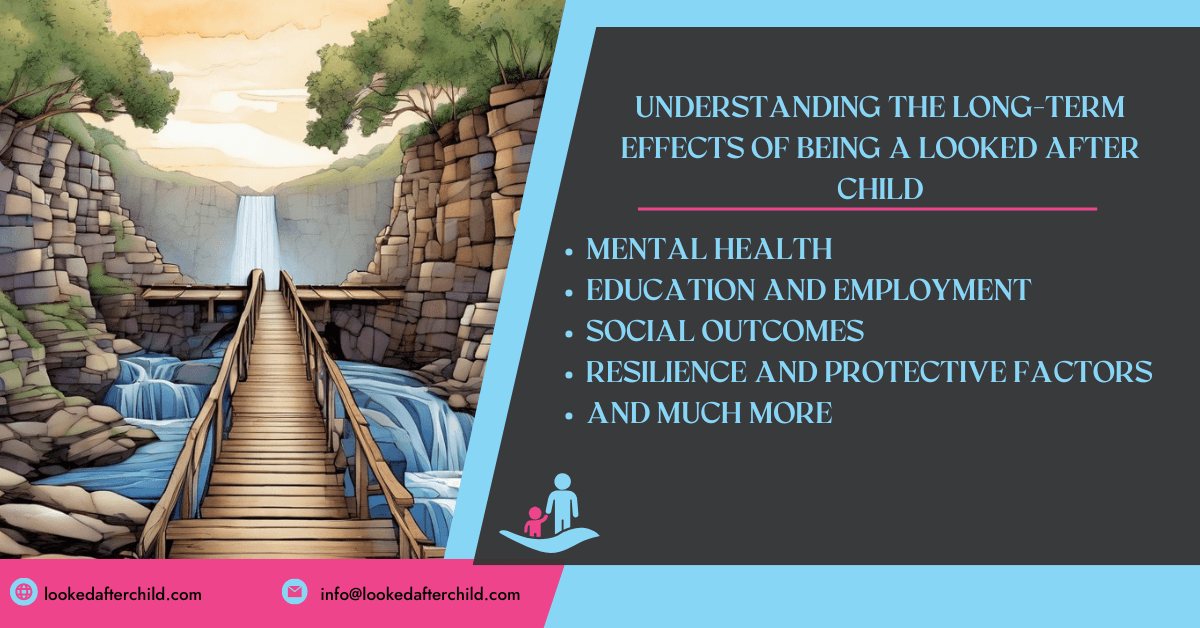Table Of Contents
Introduction:
Being a looked after child can have a profound and lasting impact on a young person’s life. While every experience is unique, there are common challenges and long-term effects that care leavers often face. This article aims to shed light on these effects, emphasizing the importance of providing comprehensive support and resources to help care leavers thrive.
Mental Health:
- Trauma and its Aftermath: Many looked after children have experienced early childhood trauma, such as abuse, neglect, or family breakdown. This trauma can lead to long-term mental health issues like anxiety, depression, and post-traumatic stress disorder (PTSD).
- Attachment and Relationships: The instability and inconsistency often associated with being in care can disrupt healthy attachment formation. This can affect a child’s ability to form trusting relationships later in life and may lead to difficulties with intimacy and emotional regulation.
- Self-Harm and Suicidal Ideation: Care leavers are at a higher risk of self-harm and suicidal ideation compared to their peers. The underlying trauma, coupled with feelings of isolation and a lack of support, can contribute to these behaviors.
Education and Employment:
- Educational Attainment: Looked after children tend to have lower educational attainment than their peers. The disruptions in their schooling, coupled with potential learning difficulties or undiagnosed special educational needs, can hinder their academic progress.
- Employment Challenges: Care leavers often face difficulties in securing and maintaining stable employment. The lack of family support, financial instability, and potential mental health challenges can create barriers to their career development.
- Homelessness: The transition from care to independent living can be particularly challenging, leaving care leavers vulnerable to homelessness. The lack of a supportive family network and inadequate preparation for independent living can contribute to this risk.
- Substance Misuse: Care leavers are more likely to experience problems with substance misuse. The underlying trauma, social isolation, and a lack of positive coping mechanisms can increase their vulnerability to addiction.
- Contact with the Criminal Justice System: Care leavers are overrepresented in the criminal justice system. The complex interplay of factors like trauma, social exclusion, and a lack of positive role models can increase the likelihood of involvement in criminal activity.
Resilience and Protective Factors:

- The Power of Resilience: Despite these challenges, many looked after children demonstrate remarkable resilience. Their ability to adapt, overcome adversity, and build a successful life is a testament to their strength and determination.
- Supportive Relationships: Positive relationships with carers, social workers, mentors, or other supportive figures can act as protective factors. These relationships can provide stability, guidance, and a sense of belonging, fostering resilience and positive development.
- Access to Quality Services: Access to quality mental health services, educational support, and advocacy programs can make a significant difference in the lives of care leavers. These services can help address the long-term effects of being in care and empower care leavers to reach their full potential.
Advocacy and Support:
- Raising Awareness: It is crucial to raise awareness about the long-term effects of being a looked after child and advocate for greater support and understanding for care leavers.
- Empowering Care Leavers: We need to empower care leavers by providing them with the resources and opportunities they need to succeed. This includes access to education, employment training, housing support, and mental health services.
- Creating a Supportive Community: Building a supportive community for care leavers is essential. This can involve mentoring programs, peer support groups, and initiatives that promote social inclusion and belonging.
Conclusion:
Being a looked after child can have a lasting impact on a young person’s life, but with the right support, care leavers can overcome challenges and achieve their goals. By raising awareness, providing comprehensive services, and fostering a supportive community, we can help care leavers thrive and reach their full potential.


0 Comments